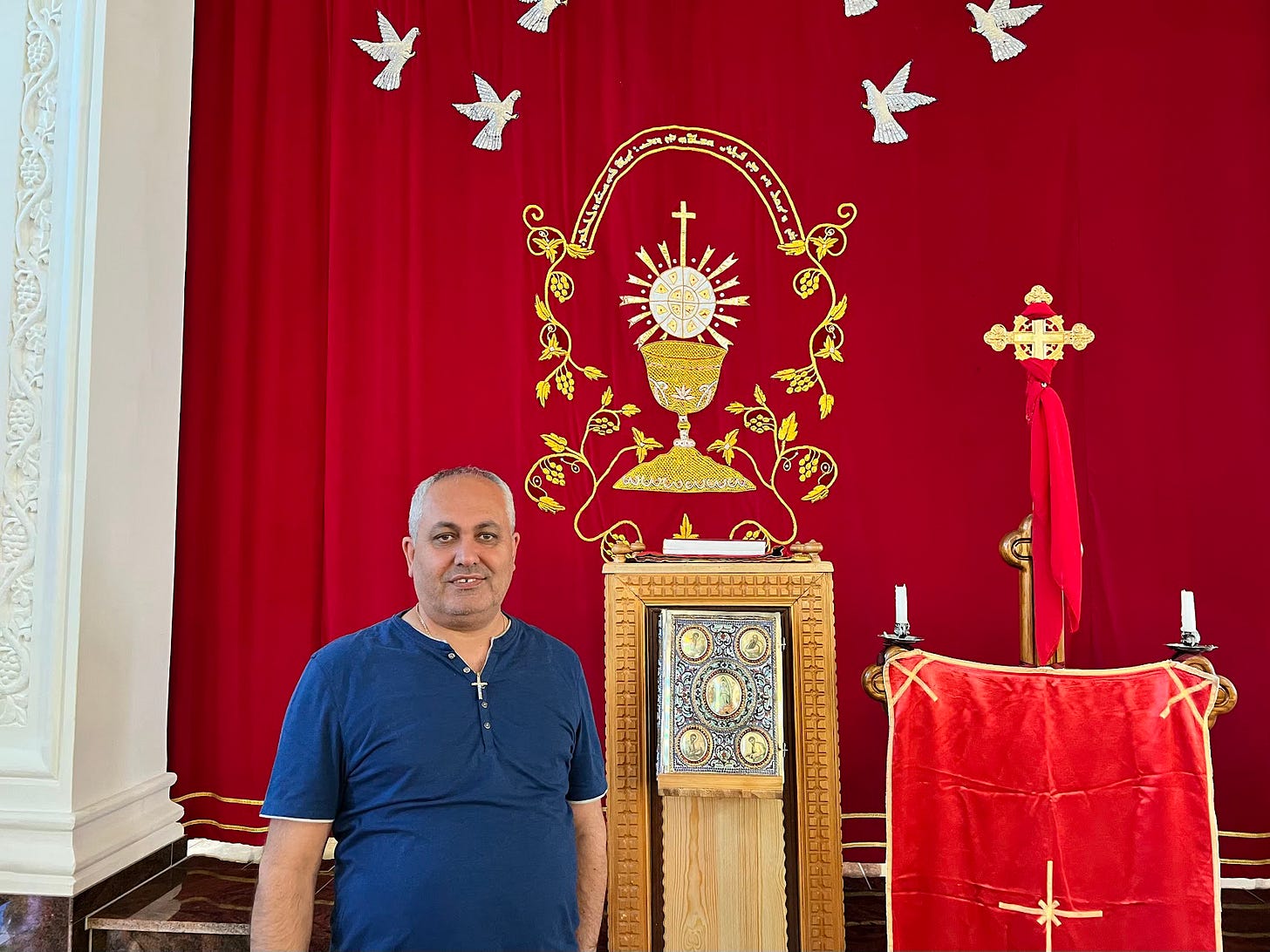Three Years of Encountering Orthodoxy - an Anniversary to Remember!
What meeting someone with kindness and a willingness to engage can do to change a life.
This may be an old story for some of you. But since it is already May 12th in my home country of Germany, and some of you may not know this yet, I want to share that three years ago, on May 12, 2022, I walked into my first Syriac Orthodox church. And boy, oh boy, was it a life changer.
I had flown to Germany for my first research trip for my PhD. After much deliberation, I had settled on my research topic: exploring the faith development of second- and third-generation children of Syriac Orthodox immigrant families from southeast Turkey, an area known as Tur Abdin, or the Mountain of the Servants (of God).
You will ask yourself, why? When I told him my topic, a German friend replied less pleasantly. His comment indicated that this topic couldn't possibly interest anyone as an academic research topic. So why did I decide on this particular area of interest?
It started when my son, who will be 36 in August, celebrated his seventh birthday in Germany. We were living in a rented apartment near my parents’ hometown. As a military family, we would be on the move again soon. Next to the two-family home where we had our apartment was another, larger house with multiple apartments on several floors. It was occupied by families who didn't look very German or speak much German, other than their children.
And it was the children who started the story. Our son had befriended several of them, and they would spend their time between our home and theirs. The moms would sometimes send along delicious food treats. Sadly, I couldn't speak with them, as we didn’t share a common language. So when our son turned seven, his friends were over to celebrate his birthday with him. With the exception of one German-looking boy, these were all children of our (as I later understood) Syriac Orthodox neighbors.
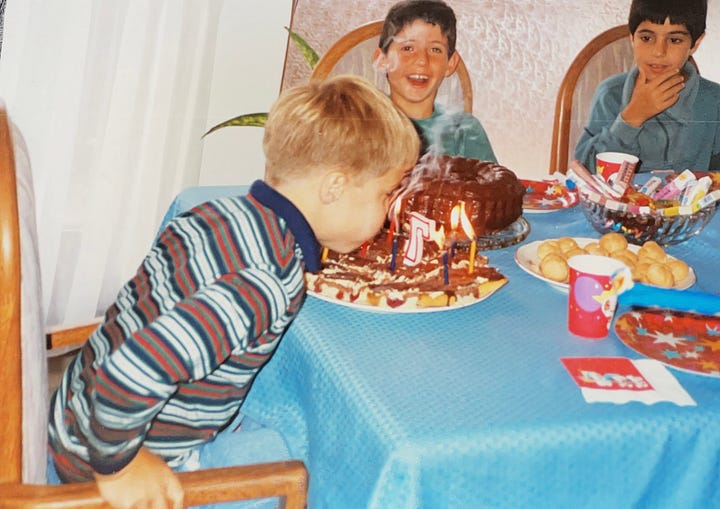
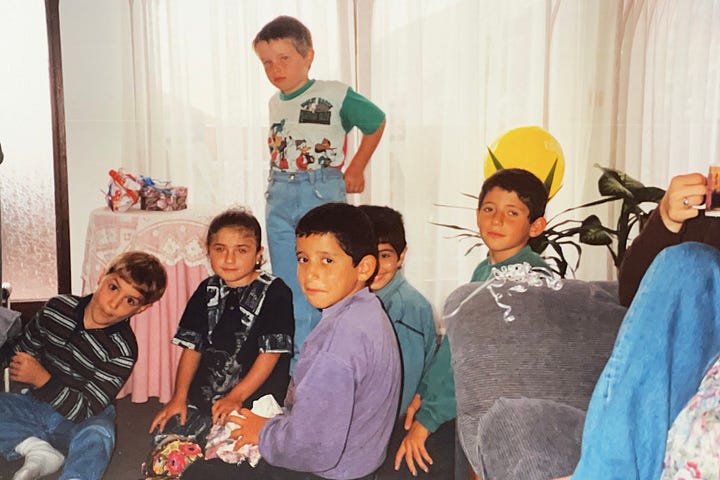
Honestly, I had no clue what that meant at the time. My dad had mentioned that they speak Aramaic, the dialect Jesus spoke, but truthfully, I didn’t even know whether they were Muslim or Christian. They were just kids my son liked, and I liked them; that was all that was needed.
So when I began deliberating research topics, this came back to mind. I was getting my PhD in Intercultural Studies, which translates to missiology, or the study of missions. As such, I was academically wondering how evangelicals could share their Christian faith with those who don’t know Jesus. Once I found out they were Syriac Orthodox, by default, as an evangelical Christian for 45 years, I did not think they had a living faith and, at best, a works-based, Catholic-like faith.
I had flown to Germany to do interviews and understand the situation better for these children from Nick’s birthday party, who would now be adults and have children of their own. Had they become evangelicals? Had they fallen away from the faith? Were they still in this rote-prayer, dead-at-best religion? If the latter two, how could we win them to Christ?
Fast-forward to mid-May, three years ago. With the aid of my sister, who lives in Germany, and an ice cream shop owner who is himself Syriac Orthodox, I set up an interview with a deacon of the local Syriac Orthodox church for May 12th. I was a bit disappointed because I really wanted to interview the priest, but I had learned that his German wasn't sufficient for an interview.
On the prior day, I had already scouted out the church:
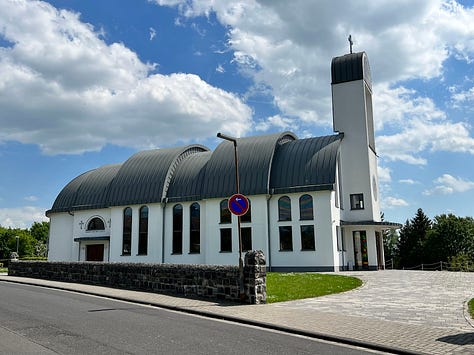


I met Mshamshono (Deacon) Yuhanun Savci at the agreed-upon time at Mor Had Bschabo with a lot of nervousness. He was dressed in a T-shirt and pants, which surprised me. I had somehow expected something more clerical-looking.
That may have been part of the icebreaking that followed. Mshamshono Yuhanun made me feel comfortable very quickly as he explained the church and the meaning of each element I saw within it.

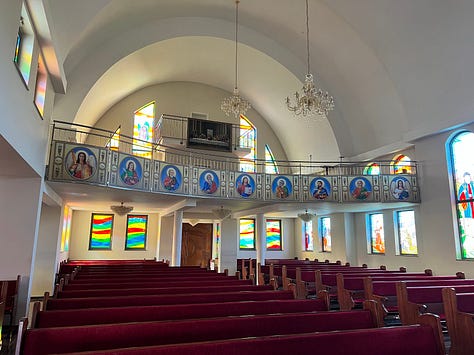


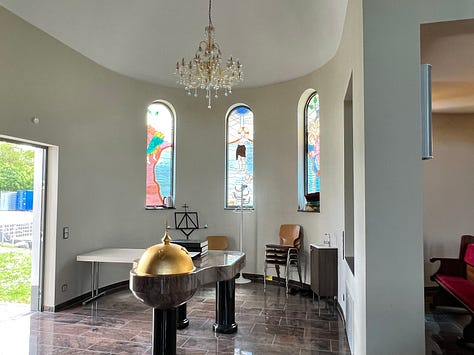
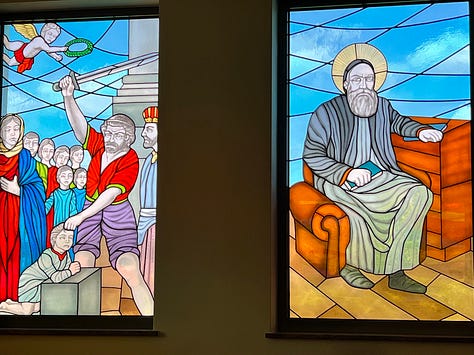
Coming out of the Roman Catholic church as a child and having seen Greek Orthodox churches from the inside on occasion due to being married to a Greek-American, I was (I think pleasantly) surprised at the lack of iconography. It was not as overwhelming to an evangelical used to box churches for the past 45 years. (I've since changed my mind, but this was May 2022.)
Mshamshono Yuhanun didn't mock me when I said clearly evangelical and prejudicial things, like, “You pray to the Virgin Mary and the saints, but I don’t see that in the Bible.” Or, “You call your priest ‘Father’ (Abouna), but Matthew 23:9 says, ‘And call no one your father on earth, for you have one Father, the one in heaven.’” He factually answered what the Syriac Orthodox tradition actually was and taught. I was floored. I had no idea there was biblical reasoning behind anything I had held at arm’s length until then. It may have left me momentarily speechless… I don’t quite remember.
I asked him many other questions, and he explained about the stained-glass windows and the meanings of the scenes and saints depicted. I learned for the first time about Sayfo, a term I had never heard before. It stands for a horrific genocide that the faithful of this ancient Christian church had to suffer through in their ancient homeland of Tur Abdin and broader Mesopotamia for many years, culminating in many killings, mutilations, and other horrors in 1915. I had no idea. Here was a Christian community that held onto their faith through conditions that Christians in the West cannot even begin to understand.
And their church was filled on Sundays. Old and young would come to celebrate the Holy Qurobo, the liturgical Eucharist celebration. Honestly, I had not expected that. I had expected rote prayers and a dying-off church. Instead, May 12th was the day that set me on a journey to understand what else I didn't know and had never been taught throughout my two master's degrees from an evangelical seminary.
I have already written extensively about how I was received into the Syriac Orthodox Church of Antioch on January 8, 2023. Today’s post reminds me (and hopefully you, dear Reader) of how this kind, polite, and well-answered first conversation with Mshamshono Yuhanun Savci opened up a road to my reconsidering everything I thought I knew about my strong faith. He didn't become offended or answer rudely. Instead, he allowed the grace of God and his own strong faith to shine through brightly. Glory to God!




